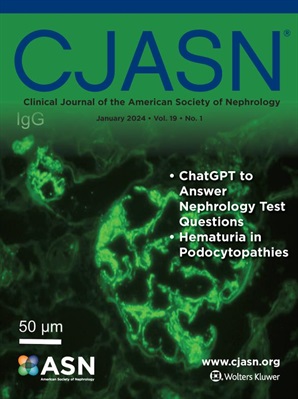The Cardiovascular-Kidney-Metabolic Health Framework: Implications for Nephrology.
IF 8.5
1区 医学
Q1 UROLOGY & NEPHROLOGY
Clinical Journal of the American Society of Nephrology
Pub Date : 2025-04-28
DOI:10.2215/cjn.0000000744
引用次数: 0
Abstract
Metabolic risk factors, chronic kidney disease, and cardiovascular disease are highly prevalent, frequently co-exist, and adversely impact lifespan and health span globally. The American Heart Association (AHA) recently defined Cardiovascular-Kidney-Metabolic (CKM) syndrome to highlight the interconnectedness between these conditions, across biological and socio-ecological domains. The CKM health initiative of the AHA seeks to improve cardiovascular and kidney health at a population level by providing a holistic approach to the management of individuals with CKM syndrome, emphasizing CKM health across the lifespan with priority for primordial/primary prevention, improving short and long-term cardiovascular risk prediction, and presenting an implementation framework for multidisciplinary health care models across diverse healthcare settings. Chronic kidney disease is a key risk factor, mediator, and therapeutic target to reduce cardiovascular disease burden, and is represented across all aspects of the AHA CKM health framework. This review article highlights the major take-aways for nephrologists from the AHA CKM health initiative. It outlines the areas where nephrologists can impact the delivery of holistic CKM care as part of the multidisciplinary team. Finally, it describes a potential future role for nephrology to guide and implement screening and early interventions for kidney disease, to move the needle towards kidney health at a population level.心血管-肾脏-代谢健康框架:对肾脏病学的启示
代谢危险因素、慢性肾脏疾病和心血管疾病非常普遍,经常共存,并对全球的寿命和健康跨度产生不利影响。美国心脏协会(AHA)最近定义了心血管-肾脏-代谢综合征(CKM),以强调这些疾病之间的相互联系,跨越生物学和社会生态领域。AHA的CKM健康倡议旨在通过提供CKM综合征个体管理的整体方法来改善人群的心血管和肾脏健康,强调CKM健康在整个生命周期中优先进行原始/初级预防,改善短期和长期心血管风险预测,并提出跨不同医疗保健环境的多学科医疗保健模式的实施框架。慢性肾脏疾病是减少心血管疾病负担的关键危险因素、中介和治疗目标,在AHA CKM健康框架的各个方面都有体现。这篇综述文章强调了AHA CKM健康倡议对肾病学家的主要启示。它概述了作为多学科团队的一部分,肾病学家可以影响整体CKM护理交付的领域。最后,它描述了肾脏病学在指导和实施肾脏疾病筛查和早期干预方面的潜在未来作用,以推动人口水平的肾脏健康。
本文章由计算机程序翻译,如有差异,请以英文原文为准。
求助全文
约1分钟内获得全文
求助全文
来源期刊
CiteScore
12.20
自引率
3.10%
发文量
514
审稿时长
3-6 weeks
期刊介绍:
The Clinical Journal of the American Society of Nephrology strives to establish itself as the foremost authority in communicating and influencing advances in clinical nephrology by (1) swiftly and effectively disseminating pivotal developments in clinical and translational research in nephrology, encompassing innovations in research methods and care delivery; (2) providing context for these advances in relation to future research directions and patient care; and (3) becoming a key voice on issues with potential implications for the clinical practice of nephrology, particularly within the United States. Original manuscript topics cover a range of areas, including Acid/Base and Electrolyte Disorders, Acute Kidney Injury and ICU Nephrology, Chronic Kidney Disease, Clinical Nephrology, Cystic Kidney Disease, Diabetes and the Kidney, Genetics, Geriatric and Palliative Nephrology, Glomerular and Tubulointerstitial Diseases, Hypertension, Maintenance Dialysis, Mineral Metabolism, Nephrolithiasis, and Transplantation.

 求助内容:
求助内容: 应助结果提醒方式:
应助结果提醒方式:


